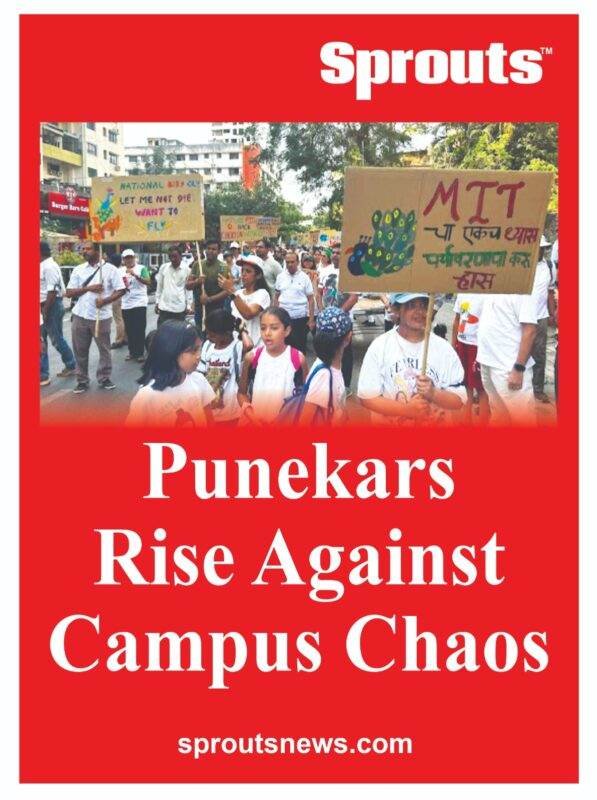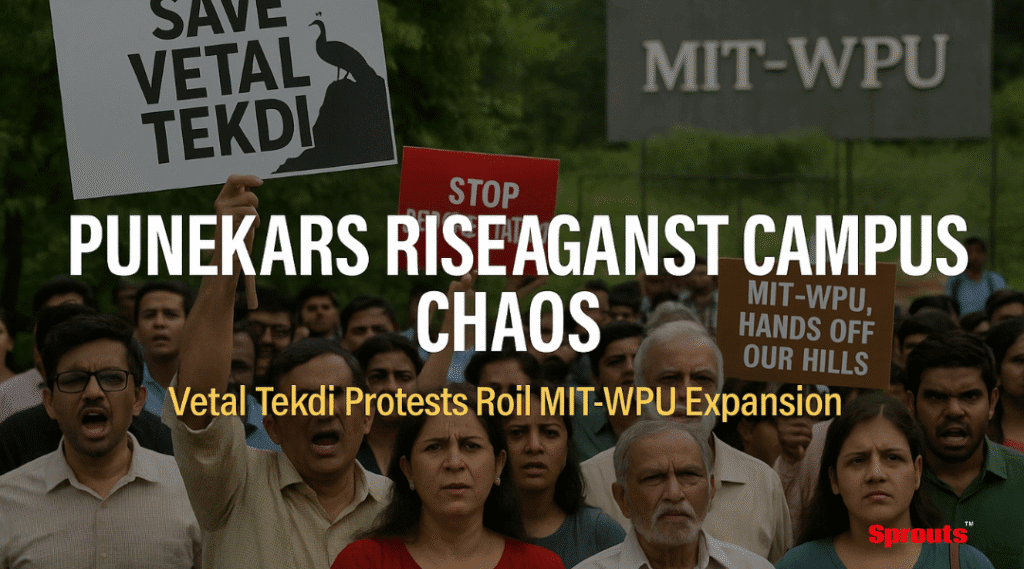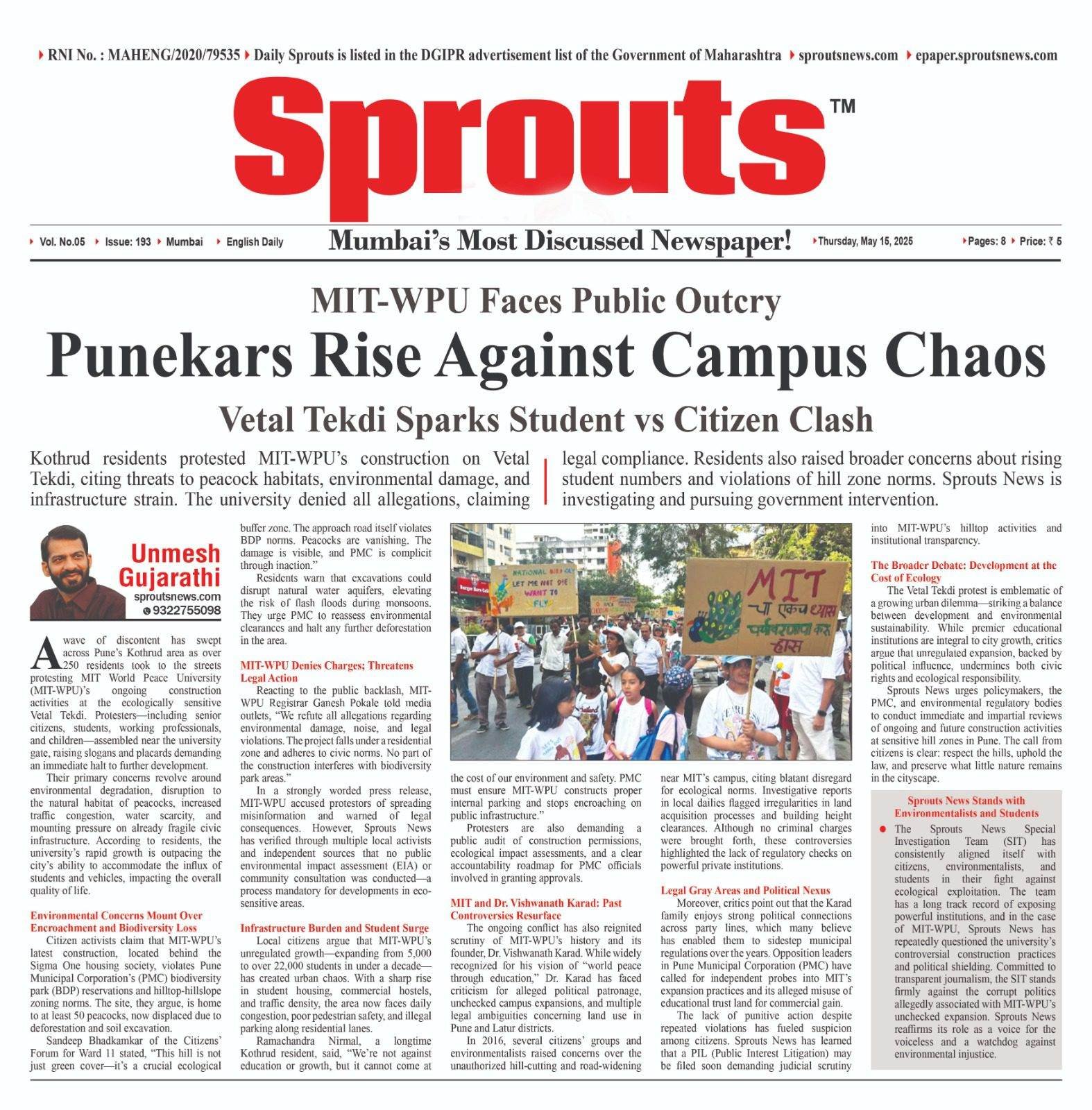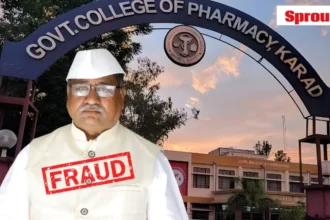Punekars Rise Against Campus Chaos
• MIT-WPU Faces Public Outcry
• Vetal Tekdi Sparks Student vs Citizen Clash
• Hilltop Havoc: Locals Protest MIT-WPU
Unmesh Gujarathi
Sprouts News Exclusive
Contact: +91 9322755098
Kothrud residents protested MIT-WPU’s construction on Vetal Tekdi, citing threats to peacock habitats, environmental damage, and infrastructure strain. The university denied all allegations, claiming legal compliance. Residents also raised broader concerns about rising student numbers and violations of hill zone norms. Sprouts News is investigating and pursuing government intervention.
Contents
- Punekars Rise Against Campus Chaos
- • MIT-WPU Faces Public Outcry
- • Vetal Tekdi Sparks Student vs Citizen Clash
- • Hilltop Havoc: Locals Protest MIT-WPU
- Environmental Concerns Mount Over Encroachment and Biodiversity Loss
- MIT-WPU Denies Charges; Threatens Legal Action
- Infrastructure Burden and Student Surge
- MIT and Dr. Vishwanath Karad: Past Controversies Resurface
- Legal Gray Areas and Political Nexus
- Also Read: Raigad Fort Served Evictions Notice: 80 Structures Face May 30 Deadline.
- The Broader Debate: Development at the Cost of Ecology
- Sprouts News Stands with Environmentalists and Students
A wave of discontent has swept across Pune’s Kothrud area as over 250 residents took to the streets protesting MIT World Peace University (MIT-WPU)’s ongoing construction activities at the ecologically sensitive Vetal Tekdi. Protesters—including senior citizens, students, working professionals, and children—assembled near the university gate, raising slogans and placards demanding an immediate halt to further development.
Their primary concerns revolve around environmental degradation, disruption to the natural habitat of peacocks, increased traffic congestion, water scarcity, and mounting pressure on already fragile civic infrastructure. According to residents, the university’s rapid growth is outpacing the city’s ability to accommodate the influx of students and vehicles, impacting the overall quality of life.
Environmental Concerns Mount Over Encroachment and Biodiversity Loss
Citizen activists claim that MIT-WPU’s latest construction, located behind the Sigma One housing society, violates Pune Municipal Corporation’s (PMC) biodiversity park (BDP) reservations and hilltop-hillslope zoning norms. The site, they argue, is home to at least 50 peacocks, now displaced due to deforestation and soil excavation.
Sandeep Bhadkamkar of the Citizens’ Forum for Ward 11 stated, “This hill is not just green cover—it’s a crucial ecological buffer zone. The approach road itself violates BDP norms. Peacocks are vanishing. The damage is visible, and PMC is complicit through inaction.”
Residents warn that excavations could disrupt natural water aquifers, elevating the risk of flash floods during monsoons. They urge PMC to reassess environmental clearances and halt any further deforestation in the area.
MIT-WPU Denies Charges; Threatens Legal Action
Reacting to the public backlash, MIT-WPU Registrar Ganesh Pokale told media outlets, “We refute all allegations regarding environmental damage, noise, and legal violations. The project falls under a residential zone and adheres to civic norms. No part of the construction interferes with biodiversity park areas.”
In a strongly worded press release, MIT-WPU accused protestors of spreading misinformation and warned of legal consequences. However, Sprouts News has verified through multiple local activists and independent sources that no public environmental impact assessment (EIA) or community consultation was conducted—a process mandatory for developments in eco-sensitive areas.

Infrastructure Burden and Student Surge
Local citizens argue that MIT-WPU’s unregulated growth—expanding from 5,000 to over 22,000 students in under a decade—has created urban chaos. With a sharp rise in student housing, commercial hostels, and traffic density, the area now faces daily congestion, poor pedestrian safety, and illegal parking along residential lanes.
Ramachandra Nirmal, a longtime Kothrud resident, said, “We’re not against education or growth, but it cannot come at the cost of our environment and safety. PMC must ensure MIT-WPU constructs proper internal parking and stops encroaching on public infrastructure.”
Protesters are also demanding a public audit of construction permissions, ecological impact assessments, and a clear accountability roadmap for PMC officials involved in granting approvals.
MIT and Dr. Vishwanath Karad: Past Controversies Resurface
The ongoing conflict has also reignited scrutiny of MIT-WPU’s history and its founder, Dr. Vishwanath Karad. While widely recognized for his vision of “world peace through education,” Dr. Karad has faced criticism for alleged political patronage, unchecked campus expansions, and multiple legal ambiguities concerning land use in Pune and Latur districts.
In 2016, several citizens’ groups and environmentalists raised concerns over the unauthorized hill-cutting and road-widening near MIT’s campus, citing blatant disregard for ecological norms. Investigative reports in local dailies flagged irregularities in land acquisition processes and building height clearances. Although no criminal charges were brought forth, these controversies highlighted the lack of regulatory checks on powerful private institutions.
Legal Gray Areas and Political Nexus
Moreover, critics point out that the Karad family enjoys strong political connections across party lines, which many believe has enabled them to sidestep municipal regulations over the years. Opposition leaders in Pune Municipal Corporation (PMC) have called for independent probes into MIT’s expansion practices and its alleged misuse of educational trust land for commercial gain.
The lack of punitive action despite repeated violations has fueled suspicion among citizens. Sprouts News has learned that a PIL (Public Interest Litigation) may be filed soon demanding judicial scrutiny into MIT-WPU’s hilltop activities and institutional transparency.
Also Read: Raigad Fort Served Evictions Notice: 80 Structures Face May 30 Deadline.
The Broader Debate: Development at the Cost of Ecology
The Vetal Tekdi protest is emblematic of a growing urban dilemma—striking a balance between development and environmental sustainability. While premier educational institutions are integral to city growth, critics argue that unregulated expansion, backed by political influence, undermines both civic rights and ecological responsibility.
Sprouts News urges policymakers, the PMC, and environmental regulatory bodies to conduct immediate and impartial reviews of ongoing and future construction activities at sensitive hill zones in Pune. The call from citizens is clear: respect the hills, uphold the law, and preserve what little nature remains in the cityscape.
Sprouts News Stands with Environmentalists and Students
The Sprouts News Special Investigation Team (SIT) has consistently aligned itself with citizens, environmentalists, and students in their fight against ecological exploitation. The team has a long track record of exposing powerful institutions, and in the case of MIT-WPU, Sprouts News has repeatedly questioned the university’s controversial construction practices and political shielding. Committed to transparent journalism, the SIT stands firmly against the corrupt politics allegedly associated with MIT-WPU’s unchecked expansion. Sprouts News reaffirms its role as a voice for the voiceless and a watchdog against environmental injustice.


















